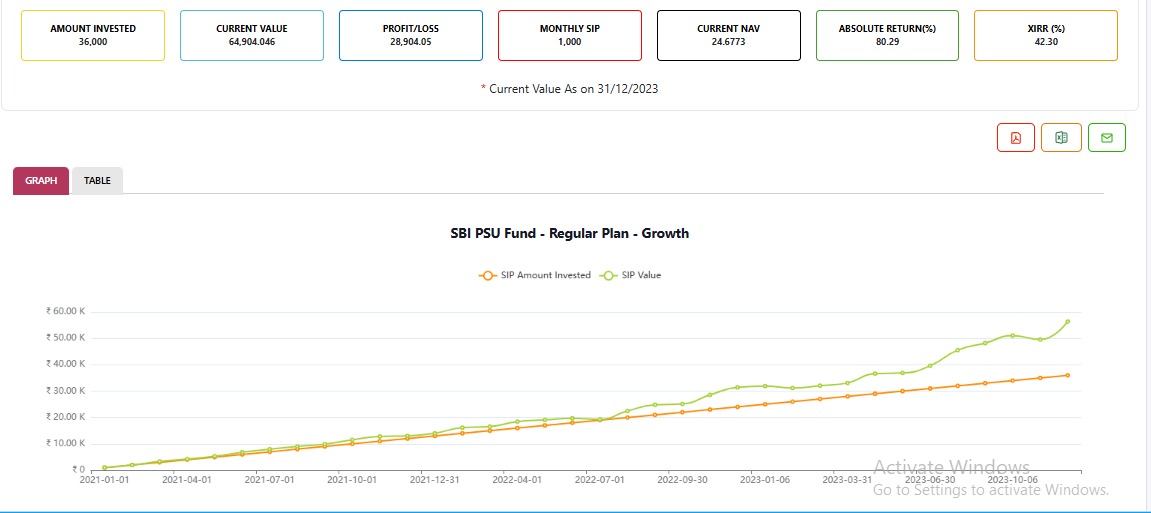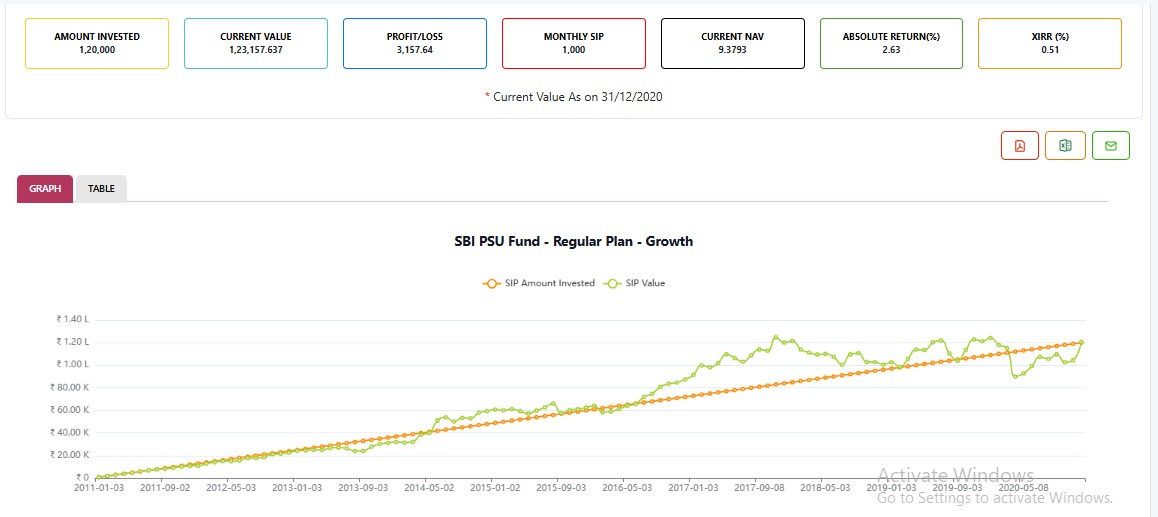PSU Mutual Funds: Invest in India Top Public Sector Funds

Thematic Funds are open ended equity schemes that follow a particular theme such as PSUs, infrastructure, etc. This article will explore all the information related to the PSU Mutual Funds including meaning, advantages, disadvantages and expected return on the funds.
What are PSU Mutual Funds?
PSU mutual funds are thematic equity mutual funds which invest exclusively in Public Sector Undertakings (PSU). Public sector undertakings are those undertakings or companies where the government holds a minimum of 51% stake. PSUs play an important role in crucial sectors of the economy such as energy, defence, infrastructure among others. In a few sectors they are monopoly businesses.
Who should invest in PSU Mutual Funds?
Now that you understand the meaning of PSU Mutual funds, you might be interested in knowing whether you should invest in these Mutual Funds or not. Let’s explore who should invest in PSU Funds.
- Secure: PSU’s are backed by the government and hence secure investments. If you are looking for long-term security and trust, consider investing in PSU mutual funds.
- High risk appetite: PSU funds like any other equity funds are subject to market fluctuations and carry risk as other equity mutual funds. Returns are volatile and they may underperform for a long period. For example, between the 2013-2020 period, the sector gave a very low annualized return on investment while they bounced back strongly in the 2020-2024 period.
- Long-term investors: In the short to medium term these being thematic funds may be volatile and returns may not be predictable compared to Diversified Equity funds. Like any other theme, entry and exit in these funds is extremely important to get decent returns. These funds are well suited for the long-term investors. Concentrated exposure in these funds should be taken under expert guidance.
Advantages of PSU Mutual Funds
Why should you invest in PSU Mutual Funds? The answer is because of the benefits it offers. Thematic mutual funds, especially PSU funds offer unique advantages and benefits which are as follows:-
Stability: PSUs are known for their stability and security because of the strong government backing that it has. This stability matched with low risk offers potential growth opportunities. PSU’s are monopoly businesses in many sectors.
Lower Risk Expectations: One of the advantages of this fund is that it is generally less riskier than other equity schemes as there is a low chance of PSUs going out of business due to backing by the government. The reason being PSUs play an important role in the core sectors of the economy like energy, capital goods, infrastructure, etc. and prioritizing their development is crucial.
Regular Dividend: PSUs pay regular dividends to its investors which might act as a regular income for investors. Investing in a dividend plan of thematic PSU fund ensures that you receive the dividend as and when it is declared.
Diversification: These funds invest in a basket of PSUs across various sectors, reducing risk through diversification.
Long-Term Potential: Since PSUs play a crucial role in India's economic growth, it offers long-term investment potential. As a developing nation, sectors like energy and infrastructure show great potential.
Professional Management: Fund managers actively research and select PSUs with strong fundamentals and growth prospects.
Tax Benefits: These funds are expected to give returns if you hold it for a longer duration. And tax applicable on long-term capital gains is 12.5% only as compared to 20% for short-term gains.
Monopoly: PSU sectors are majorly monopolised sectors which make them a big player and therefore you can expect a stable return in the long term.
Disadvantages of PSU Mutual Funds
With these unique advantages comes a few risk factors or disadvantages of PSU funds as well. The risks associated with these funds are listed below:-
Lower returns: Since these funds are viewed as low-risk bearing, it may offer lower returns as compared to other mutual fund schemes.
Poor performance in the short run: You should invest your money in such funds for a minimum of 5-7 years to expect a good return. In case you withdraw your investment in a short period, you might not see any major improvement in the performance.
Risk associated: These funds are not completely risk-free. They invest in equities and in the short run, they are volatile as such, long-term investors and conservative investors are more likely to invest in these funds.
Government Influence: PSU’s have 51% or more government’s stake which results in greater governmental and political influence in it.
Thematic PSU Funds Return Calculator
Thematic PSU Funds are subject to risks and you can not always expect higher returns. They can prove to be stable in long duration but they may be volatile because these funds are based on specific themes.


From the above graphs, we can conclude that psu mutual funds can give a high annualized return of around 40% or can also give a return as low as 0.26%. Hence you need proper monitoring and knowledge for reducing risks. Our experts at Finstreet India Investment Services LLP are dedicated to guiding you through the complexities of PSU mutual funds, analyzing the daily moments helping you make informed investment choices and managing the associated risks.
Taxability of PSU Mutual Fund
Mutual Fund taxation knowledge is as important as knowing the other details about the funds. Here is an overview of the PSU Funds taxation:-
|
Taxability on Dividends Investing in dividend plans of PSU funds is known for consistent dividends it offers as and when declared. And this income by dividend which is treated as your personal income is taxed according to the income tax slab your income falls in. |
|
Taxability on Gains Short-term capital gain: If your total holding period is less than 12 months then the gain on such investment is classified as short-term capital gains. These gains are taxed at a flat 20% rate. Long-term capital gain (LTCG): If your total holding period is more than 12 months i.e. if you stay invested in the funds for more than an year then the gain on such investment is classified as long-term capital gains. These gains are taxed at a flat rate of 12.5%. However, only LTCG of more than 1.25 Lakh Rs is subject to tax. |
What are the best PSU Funds to invest in 2025?
| ICICI PRUDENTIAL PSU EQUITY FUND |
| SBI PSU FUNDS |
| ADITYA BIRLA SUN LIFE PSU EQUITY FUND |
How to invest in PSU Mutual Funds?
Investing in PSU Mutual Funds is an easy process, all you need is to follow the following steps:-
STEP 1 Contact us at 8094352000.
STEP 2 Register with Finstreet India Investment Services LLP.
STEP 3 Enter your KYC details and get started!
How to choose PSU mutual funds?
Choosing the best PSU funds might be a challenging task but not when you have consulted our experienced advisors. Since mutual fund investment is a critical financial decision, you should invest enough time researching to select the best option. From understanding the fund performance to risk associated with market predictions, you should try to know different dynamics. Here are some of the factors that investors should consider before investing.
Financial goal: Setting your financial goal is the most important and foremost step. After setting your goal, make sure the PSU mutual fund investment aligns with your overall financial plan for the best results. It is critical to evaluate the fund's objective and align it with your financial goals before investing.
Fund performance: Analyzing fund performance in different market conditions will help you choose a reliable fund. You can analyse the performance by tracking past performance, using expected returns calculator, and checking Net Asset value among others. Though past performance is no guarantee of future performance, a rule of thumb is to choose a fund that has performed consistently in bullish and bearish markets.
Fund house and management: Asset management companies and fund managers play a decisive role in selecting stocks, allocation, and management. If the fund manager is experienced, the fund will perform better and deliver good returns.
Avoid Concentration: You should check the fund allocation and avoid investing in funds with money concentrated in only a few stocks. The higher the diversification in the fund, the lower is the risk associated. Thus, it is recommended to invest in diversified funds.
Expenses and fees: Mutual fund investing involves costs, and it can impact the ultimate returns from your investment. Before selecting a fund for investment, review the costs you will have to bear regarding expense ratio and exit load.
Other factors: There are a few additional factors like the NAV value of the units, assets under management, investible corpus, and tenure that investors need to consider before selecting a reliable PSU mutual fund.
Conclusion
PSU funds are good investment options for a long duration. PSU mutual funds seek to offer investors the potential benefits of relative stability, capital appreciation, and diversification. As we can see from the above, entry and exit in thematic mutual funds is extremely important, hence consulting a financial advisor is recommended for a pleasant investment experience. Talk to our financial advisors to make the best investment decision and enjoy attractive returns.
FAQs
1. What is the difference between thematic funds and sectoral funds?
Both thematic and sectoral funds are types of equity mutual fund schemes but are different in characteristics. Thematic funds are the funds which follow a particular theme like PSUs, Infrastructure etc. while investing whereas a sectoral fund invests in a particular sector such as banking, finance, energy, etc.
2. For how long should I invest my money in PSU funds?
You can invest in the funds for any duration you want but it is recommended that you invest your money in PSU funds for at least 5 years. This is because investment in PSUs are believed to give good returns in long duration only.
3. Are Thematic PSU funds more diversified than sectoral funds?
Yes. Thematic PSU funds are more broad based and diversified than sectoral funds. This is because thematic funds invest in particular themes which can span across sectors whereas sectoral funds are restricted to only a particular sector.
4. Are thematic PSU funds risk-free?
No, Thematic-PSU Mutual Funds invest in equities, so in the short-term, they can be volatile. However, over the long-term, the risk comes down substantially.